- Home
- Terry Brooks
The Scions of Shannara Page 3
The Scions of Shannara Read online
Page 3
They slipped down the alleyway past startled faces and wide eyes, turned into a passageway Par would have sworn he had never seen before despite his many excursions out that way, passed through a scattering of doors and anterooms and finally emerged into a new street entirely. No one spoke. When at last they were beyond the sound of the shouting and the glow of the fire, the stranger slowed, motioned his two companions to take up watch and pulled Par and Coll into a shadowed alcove.
All were breathing heavily from the run. The stranger looked at them in turn, grinning. “A little exercise is good for the digestion, they say. What do you think? Are you all right?”
The brothers both nodded. “Who are you?” asked Par.
The grin broadened. “Why, practically one of the family, lad. Don’t you recognize me? Ah, you don’t, do you? But, then, why should you? After all, you and I have never met. But the songs should remind you.” He closed his left hand into a fist, then thrust a single finger sharply at Par’s nose. “Remember now?”
Mystified, Par looked at Coll, but his brother appeared as confused as he was. “I don’t think . . .” he started.
“Well, well, it doesn’t matter just at the moment. All in good time.” He bent close. “This is no longer safe country for you, lad. Certainly not here in Varfleet and probably not in all of Callahorn. Maybe not anywhere. Do you know who that was back there? The ugly one with the whisper?”
Par tried to place the rangy speaker with the soft voice. He couldn’t. He shook his head slowly.
“Rimmer Dall,” the stranger said, the smile gone now. “First Seeker, the high mucky-muck himself. Sits on the Coalition Council when he’s not out swatting flies. But you, he’s taken a special interest if he’s come all the way to Varfleet to arrest you. That’s not part of his ordinary fly-swatting. That’s hunting bear. He thinks you are dangerous, lad—very dangerous, indeed, or he wouldn’t have bothered coming all the way here. Good thing I was looking out for you. I was, you know. Heard Rimmer Dall was going to come for you and came to make sure he didn’t get the job done. Mind now, he won’t give up. You slipped his grasp this time, but that will make him just that much more determined. He’ll keep coming for you.”
He paused, gauging the effect of what he was saying. Par was staring at him speechlessly, so he went on. “That magic of yours, the singing, that’s real magic, isn’t it? I’ve seen enough of the other kind to know. You could put that magic to good use, lad, if you had a mind to. It’s wasted in these ale houses and backstreets.”
“What do you mean?” Coll asked, suddenly suspicious.
The stranger smiled, charming and guileless. “The Movement has need of such magic,” he said softly.
Coll snorted. “You’re one of the outlaws!”
The stranger executed a quick bow. “Yes, lad, I am proud to say I am. More important, I am free-born and I do not accept Federation rule. No right-thinking man does.” He bent close. “You don’t accept it yourself now, do you? Admit it.”
“Hardly,” Coll answered defensively. “But I question whether the outlaws are any better.”
“Harsh words, lad!” the other exclaimed. “A good thing for you I do not take offense easily.” He grinned roguishly.
“What is it you want?” Par interrupted quickly, his mind clear again. He had been thinking of Rimmer Dall. He knew the man’s reputation and he was frightened of the prospect of being hunted by him. “You want us to join you, is that it?”
The stranger nodded. “You would find it worth your time, I think.”
But Par shook his head. It was one thing to accept the stranger’s help in fleeing the Seekers. It was another to join the Movement. The matter needed a great deal more thought. “I think we had better decline for now,” he said evenly. “That is, if we’re being given a choice.”
“Of course you are being given a choice!” The stranger seemed offended.
“Then we have to say no. But we thank you for the offer and especially for your help back there.”
The stranger studied him a moment, solemn again. “You are quite welcome, believe me. I wish only the best for you, Par Ohmsford. Here, take this.” He removed from one hand a ring that was cast in silver and bore the insigne of a hawk. “My friends know me by this. If you need a favor—or if you change your mind—take this to Kiltan Forge at Reaver’s End at the north edge of the city and ask for the Archer. Can you remember that?”
Par hesitated, then took the ring, nodding. “But why . . .?”
“Because there is much between us, lad,” the other said softly, anticipating his question. One hand reached out to rest on his shoulder. The eyes took in Coll as well. “There is history that binds us, a bond of such strength that it requires I be there for you if I can. More, it requires that we stand together against what is threatening this land. Remember that, too. One day, we will do so, I think—if we all manage to stay alive until then.”
He grinned at the brothers and they stared back silently. The stranger’s hand dropped away. “Time to go now. Quickly, too. The street runs east to the river. You can go where you wish from there. But watch yourselves. Keep your backs well guarded. This matter isn’t finished.”
“I know,” Par said and extended his hand. “Are you certain you will not tell us your name?”
The stranger hesitated. “Another day,” he said.
He gripped Par’s hand tightly, then Coll’s, then whistled his companions to him. He waved once, then melted into the shadows and was gone.
Par stared down momentarily at the ring, then glanced questioningly at Coll. Somewhere close at hand, the sound of shouting started up.
“I think the questions will have to wait,” said Coll.
Par jammed the ring into his pocket. Wordlessly, they disappeared into the night.
III
It was nearing midnight by the time Par and Coll reached the waterfront section of Varfleet, and it was there that they first realized how ill-prepared they were to make their escape from Rimmer Dall and his Federation Seekers. Neither had expected that flight would prove necessary, so neither had brought anything that a lengthy journey might require. They had no food, no blankets, no weapons save for the standard long knives all Valemen wore, no camping gear or foul-weather equipment, and worst of all, no money. The ale house keeper hadn’t paid them in a month. What money they had managed to save from the month before had been lost in the fire along with everything else they owned. They had only the clothes on their backs and a growing fear that perhaps they should have stuck with the nameless stranger a bit longer.
The waterfront was a ramshackle mass of boathouses, piers, mending shops, and storage sheds. Lights burned along its length, and dockworkers and fishermen drank and joked in the light of oil lamps and pipes. Smoke rose out of tin stoves and barrels, and the smell of fish hung over everything.
“Maybe they’ve given up on us for the night,” Par suggested at one point. “The Seekers, I mean. Maybe they won’t bother looking anymore until morning—or maybe not at all.”
Coll glanced at him and arched one eyebrow meaningfully. “Maybe cows can fly too.” He looked away. “We should have insisted we be paid more promptly for our work. Then we wouldn’t be in this fix.”
Par shrugged. “It wouldn’t have made any difference.”
“It wouldn’t? We’d at least have some money!”
“Only if we’d thought to carry it with us to the performance. How likely is that?”
Coll hunched his shoulders and screwed up his face. “That ale house keeper owes us.”
They walked all the way to the south end of the docks without speaking further, stopped finally as the lighted waterfront gave way to darkness, and stood looking at each other. The night was cooler now and their clothes were too thin to protect them. They were shivering, their hands jammed down in their pockets, their arms clamped tightly against their sides. Insects buzzed about them annoyingly.
Coll sighed. “Do you have any idea where we’re going
, Par? Do you have some kind of plan in mind?”
Par took out his hands and rubbed them briskly. “I do. But it requires a boat to get there.”
“South, then—down the Mermidon?”
“All the way.”
Coll smiled, misunderstanding. He thought they were headed back to Shady Vale. Par decided it was best to leave him with that impression.
“Wait here,” Coll said suddenly and disappeared before Par could object.
Par stood alone in the dark at the end of the docks for what seemed like an hour, but was probably closer to half that. He walked over to a bench by a fishing shack and sat down, hunched up against the night air. He was feeling a mix of things. He was angry, mostly—at the stranger for spiriting them away and then abandoning them—all right, so Par had asked to have it that way, that didn’t make him feel any better—at the Federation for chasing them out from the city like common thieves, and at himself for being stupid enough to think he could get away with using real magic when it was absolutely forbidden to do so. It was one thing to play around with the magics of sleight of hand and quick change; it was another altogether to employ the magic of the wishsong. It was too obviously the real thing, and he should have known that sooner or later word of its use would get back to the authorities.
He put his legs out in front of him and crossed his boots. Well, there was nothing to be done about it now. Coll and he would simply have to start over again. It never occurred to him to quit. The stories were too important for that; it was his responsibility to see to it that they were not forgotten. He was convinced that the magic was a gift he had received expressly for that purpose. It didn’t matter what the Federation said—that magic was outlawed and that it was a source of great harm to the land and its people. What did the Federation know of magic? Those on the Coalition Council lacked any practical experience. They had simply decided that something needed to be done to address the concerns of those who claimed parts of the Four Lands were sickening and men were being turned into something like the dark creatures of Jair Ohmsford’s time, creatures from some nether existence that defied understanding, beings that drew their power from the night and from magics lost since the time of the Druids.
They even had names, these creatures. They were called Shadowen.
Suddenly, unpleasantly, Par thought again of the dreams and of the dark thing within them that had summoned him.
He was aware then that the night had gone still; the voices of the fishermen and dockworkers, the buzz of the insects, and even the rustle of the night wind had disappeared. He could hear the sound of his own pulse in his ears, and a whisper of something else . . .
Then a splash of water brought him to his feet with a start. Coll appeared, clambering out of the Mermidon at the river’s edge a dozen feet away, shedding water as he came. He was naked. Par recovered his composure and stared at him in disbelief.
“Shades, you frightened me! What were you doing?”
“What does it look like I was doing?” Coll grinned. “I was out swimming!”
What he was really doing, Par discovered after applying a bit more pressure, was appropriating a fishing skiff owned by the keeper of the Blue Whisker. The keeper had mentioned it to Coll once or twice when bragging about his fishing skills. Coll had remembered it when Par had mentioned needing a boat, remembered as well the description of the boat shed where the man said it was kept, and gone off to find it. He’d simply swum up to where it was stored, snapped the lock on the shed, slipped the mooring lines and towed it away.
“It’s the least he owes us after the kind of business we brought in,” he said defensively as he brushed himself dry and dressed.
Par didn’t argue the point. They needed a boat worse than the ale house keeper, and this was probably their only chance to find one. Assuming the Seekers were still scouring the city for them, their only other alternative was to strike out on foot into the Runne Mountains—an undertaking that would require more than a week. A ride down the Mermidon was a journey of only a few days. It wasn’t as if they were stealing the boat, after all. He caught himself. Well, maybe it was. But they would return it or provide proper compensation when they could.
The skiff was only a dozen feet in length, but it was equipped with oars, fishing gear, some cooking and camping equipment, a pair of blankets, and a canvas tarp. They boarded and pushed off into the night, letting the current carry them out from the shore and sweep them away.
They rode the river south for the remainder of the night, using the oars to keep it in mid-channel, listening to the night sounds, watching the shoreline, and trying to stay awake. As they traveled, Coll offered his theory on what they should do next. It was impossible, of course, to go back into Callahorn any time in the immediate future. The Federation would be looking for them. It would be dangerous, in fact, to travel to any of the major Southland cities because the Federation authorities stationed there would be alerted as well. It was best that they simply return to the Vale. They could still tell the stories—not right away perhaps, but in a month or so after the Federation had stopped looking for them. Then, later, they could travel to some of the smaller hamlets, the more isolated communities, places the Federation seldom visited. It would all work out fine.
Par let him ramble. He was willing to bet that Coll didn’t believe a word of it; and even if he did, there was no point in arguing about it now.
They pulled into shore at sunrise and made camp in a grove of shade trees at the base of a windswept bluff, sleeping until noon, then rising to catch and eat fish. They were back on the river by early afternoon and continued on until well after sunset. Again they pulled into shore and made camp. It was starting to rain, and they put up the canvas to provide shelter. They made a small fire, pulled the blankets close, and sat silently facing the river, watching the raindrops swell its flow and form intricate patterns on its shimmering surface.
They spoke then for a while about how things had changed in the Four Lands since the time of Jair Ohmsford.
Three hundred years ago, the Federation governed only the deep Southland cities, adopting a strict policy of isolationism. The Coalition Council provided its leadership even then, a body of men selected by the cities as representatives to its government. But it was the Federation armies that gradually came to dominate the Council, and in time the policy of isolationism gave way to one of expansion. It was time to extend its sphere of influence, the Federation determined—to push back its frontiers and offer a choice of leadership to the remainder of the Southland. It was logical that the Southland should be united under a single government, and who better to do that than the Federation?
That was the way it started. The Federation began a push north, gobbling up bits and pieces of the Southland as it went. A hundred years after the death of Jair Ohmsford, everything south of Callahorn was Federation governed. The other races, the Elves, the Trolls, the Dwarves, and even the Gnomes cast nervous glances south. Before long, Callahorn agreed to become a protectorate, its Kings long dead, its cities feuding and divided, and the last buffer between the Federation and the other lands disappeared.
It was about this same time that the rumors of the Shadowen began to surface. It was said that the magic of the old days was at fault, magic that had taken seed in the earth and nurtured there for decades and was now coming to life. The magic took many forms, sometimes as nothing more than a cold wind, sometimes as something vaguely human. It was labeled, in any case, as Shadowen. The Shadowen sickened the land and its life, turning pockets of it into quagmires of decay and lifelessness. They attacked mortal creatures, man or beast, and, when they were sufficiently weakened, took them over completely, stealing into their bodies and residing there, hidden wraiths. They needed the life of others for their own sustenance. That was how they survived.
The Federation lent credibility to those rumors by proclaiming that such creatures might indeed exist and only it was strong enough to protect against them.
No one argue
d that the magic might not be at fault or that the Shadowen or whatever it was that was causing the problem had nothing to do with magic at all. It was easier simply to accept the explanation offered. After all, there hadn’t been any magic in the land since the passing of the Druids. The Ohmsfords told their stories, of course, but only a few heard and fewer still believed. Most thought the Druids just a legend. When Callahorn agreed to become a protectorate and the city of Tyrsis was occupied, the Sword of Shannara disappeared. No one thought much of it. No one knew how it happened, and no one much cared. The Sword hadn’t even been seen for over two hundred years. There was only the vault that was said to contain it, the blade set in a block of Tre-Stone, there in the center of the People’s Park—and then one day that was gone as well.
The Elfstones disappeared not long after. There was no record of what became of them. Not even the Ohmsfords knew.
Then the Elves began to disappear as well, entire communities, whole cities at a time, until even Arborlon was gone. Finally, there were no more Elves at all; it was as if they had never been. The Westland was deserted, save for a few hunters and trappers from the other lands and the wandering bands of Rovers. The Rovers, unwelcome anyplace else, had always been there, but even the Rovers claimed to know nothing of what had become of the Elves. The Federation quickly took advantage of the situation. The Westland, it declared, was the seeding ground for the magic that was at the root of the problems in the Four Lands. It was the Elves, after all, who introduced magic into the Lands years earlier. It was the Elves who first practiced it. The magic had consumed them—an object lesson on what would happen to all those who tried to do likewise.
The Federation emphasized the point by forbidding the practice of magic in any form. The Westland was made a protectorate, albeit an unoccupied one since the Federation lacked enough soldiers to patrol so vast a territory unaided, but one that would be cleansed eventually, it was promised, of the ill effects of any lingering magic.

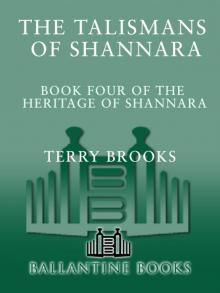 The Talismans of Shannara
The Talismans of Shannara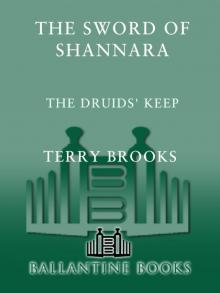 The Sword of Shannara: The Druids' Keep: The Druids' Keep
The Sword of Shannara: The Druids' Keep: The Druids' Keep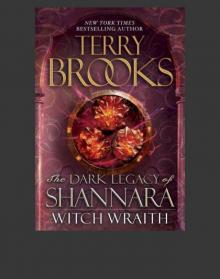 Witch Wraith
Witch Wraith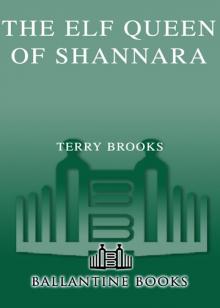 The Elf Queen of Shannara
The Elf Queen of Shannara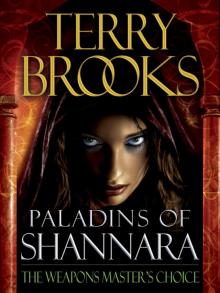 The Weapons Master's Choice
The Weapons Master's Choice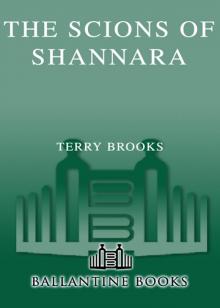 The Scions of Shannara
The Scions of Shannara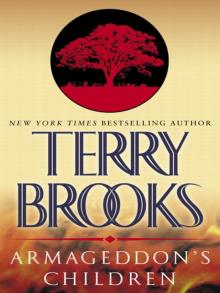 Armageddon's Children
Armageddon's Children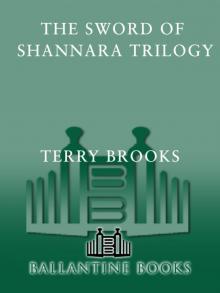 The Sword of Shannara Trilogy the Sword of Shannara Trilogy
The Sword of Shannara Trilogy the Sword of Shannara Trilogy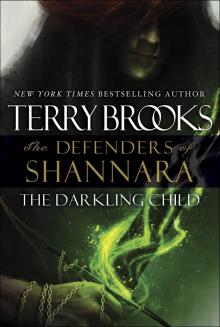 The Darkling Child
The Darkling Child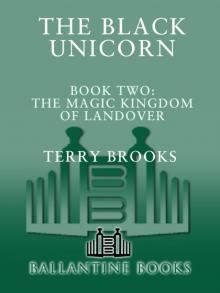 The Black Unicorn
The Black Unicorn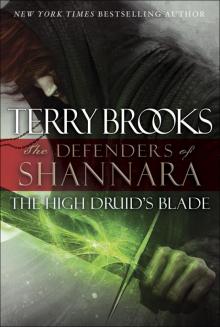 The High Druid's Blade
The High Druid's Blade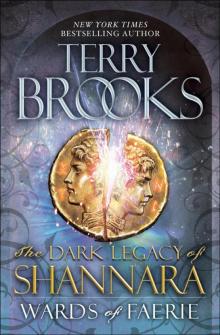 Wards of Faerie
Wards of Faerie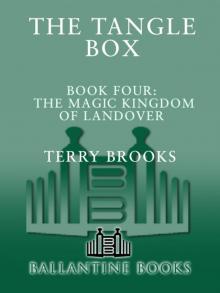 The Tangle Box
The Tangle Box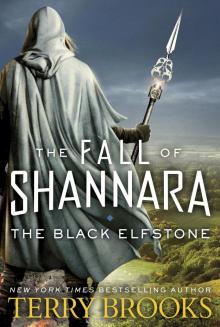 The Black Elfstone
The Black Elfstone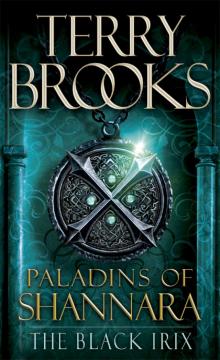 The Black Irix
The Black Irix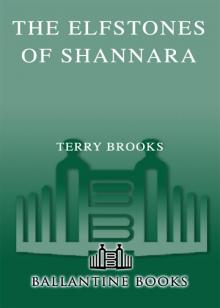 The Elfstones of Shannara
The Elfstones of Shannara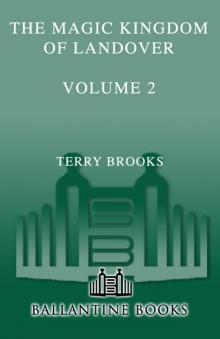 The Magic Kingdom of Landover Volume 2
The Magic Kingdom of Landover Volume 2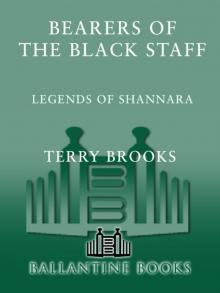 Bearers of the Black Staff
Bearers of the Black Staff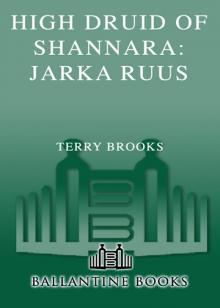 Jarka Ruus
Jarka Ruus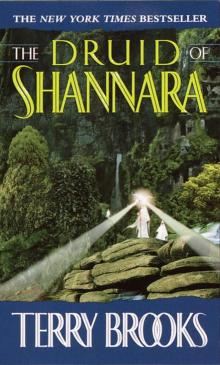 The Druid of Shannara
The Druid of Shannara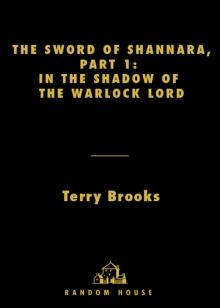 The Sword of Shannara
The Sword of Shannara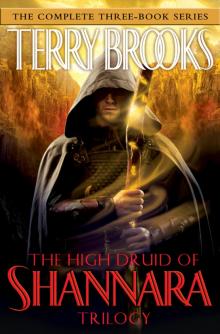 The High Druid of Shannara Trilogy
The High Druid of Shannara Trilogy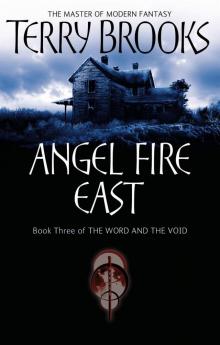 Angel Fire East
Angel Fire East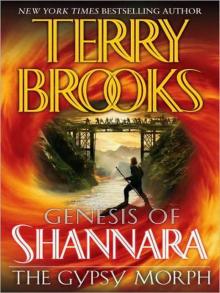 The Gypsy Morph
The Gypsy Morph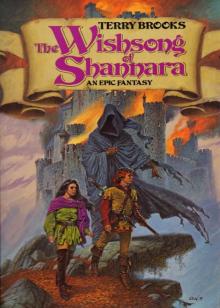 The Wishsong of Shannara
The Wishsong of Shannara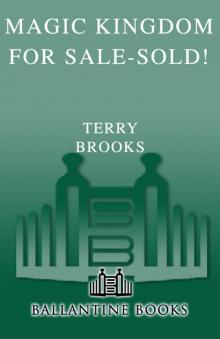 Magic Kingdom for Sale--Sold
Magic Kingdom for Sale--Sold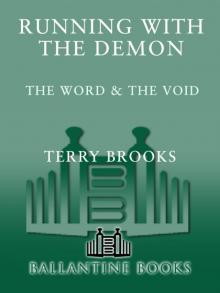 Running With the Demon
Running With the Demon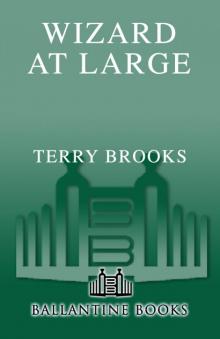 Wizard at Large
Wizard at Large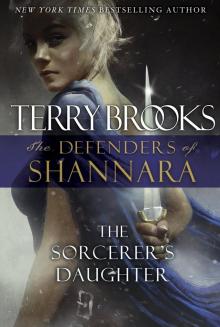 The Sorcerer's Daughter
The Sorcerer's Daughter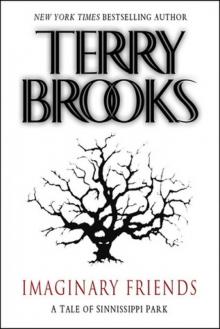 Imaginary Friends
Imaginary Friends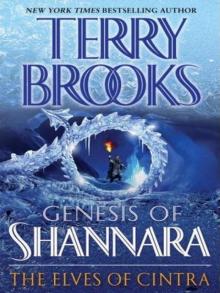 The Elves of Cintra
The Elves of Cintra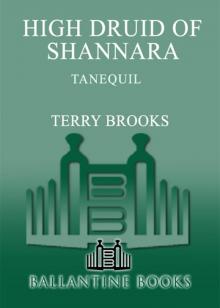 Tanequil
Tanequil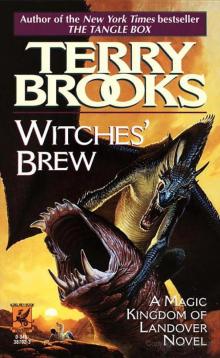 Witches' Brew
Witches' Brew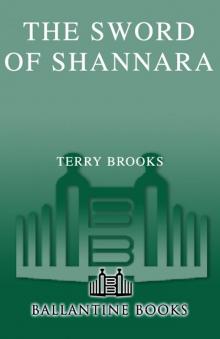 The Sword of the Shannara and the Elfstones of Shannara
The Sword of the Shannara and the Elfstones of Shannara The World of Shannara
The World of Shannara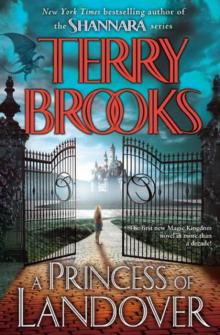 A Princess of Landover
A Princess of Landover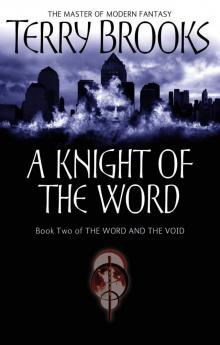 A Knight of the Word
A Knight of the Word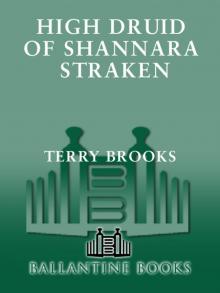 Straken
Straken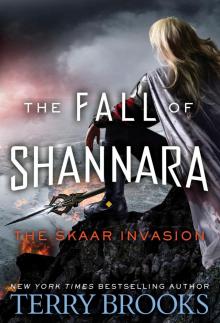 The Skaar Invasion
The Skaar Invasion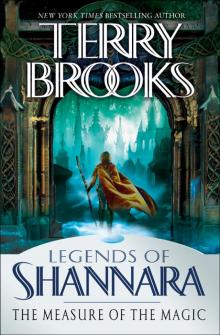 The Measure of the Magic: Legends of Shannara
The Measure of the Magic: Legends of Shannara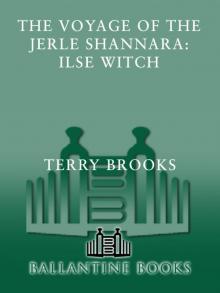 Ilse Witch
Ilse Witch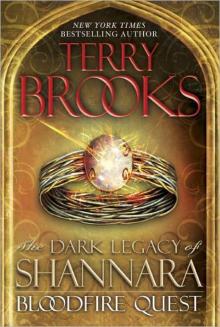 Bloodfire Quest
Bloodfire Quest The Stiehl Assassin
The Stiehl Assassin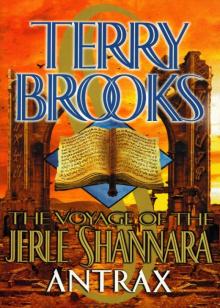 Antrax
Antrax The Last Druid
The Last Druid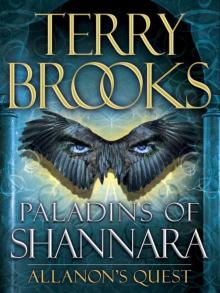 Paladins of Shannara: Allanon's Quest
Paladins of Shannara: Allanon's Quest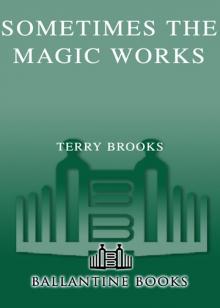 Sometimes the Magic Works: Lessons From a Writing Life
Sometimes the Magic Works: Lessons From a Writing Life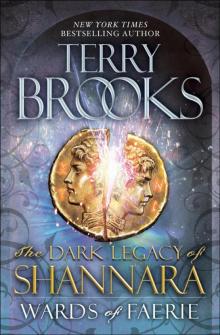 Wards of Faerie: The Dark Legacy of Shannara
Wards of Faerie: The Dark Legacy of Shannara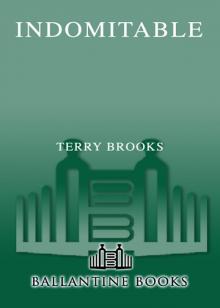 Indomitable: The Epilogue to The Wishsong of Shannara
Indomitable: The Epilogue to The Wishsong of Shannara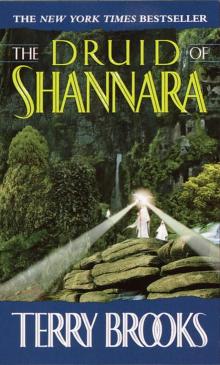 Heritage of Shannara 01 - The Druid of Shannara
Heritage of Shannara 01 - The Druid of Shannara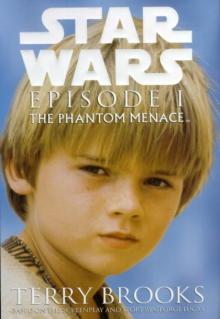 Star Wars - Phantom Menace
Star Wars - Phantom Menace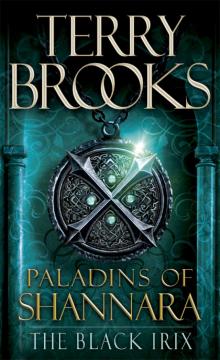 The Dark Legacy of Shannara Trilogy 3-Book Bundle
The Dark Legacy of Shannara Trilogy 3-Book Bundle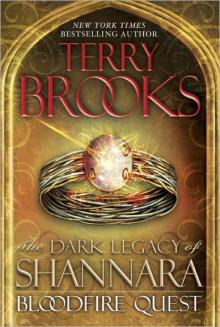 The Bloodfire Quest
The Bloodfire Quest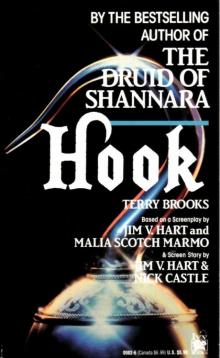 The Hook (1991)
The Hook (1991) Star Wars: Episode I: The Phantom Menace
Star Wars: Episode I: The Phantom Menace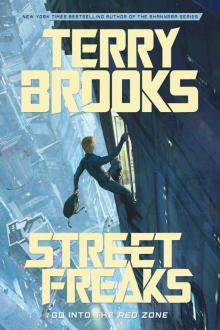 Street Freaks
Street Freaks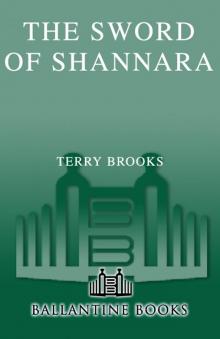 The Sword of Shannara & Elfstones of Shannara
The Sword of Shannara & Elfstones of Shannara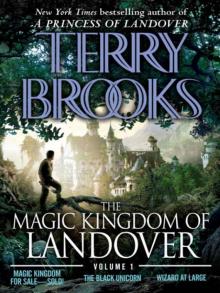 The Magic Kingdom of Landover , Volume 1
The Magic Kingdom of Landover , Volume 1 The Phantom Menace
The Phantom Menace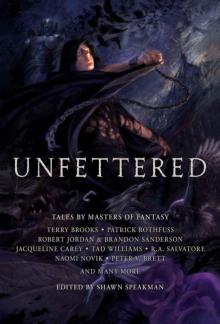 Unfettered
Unfettered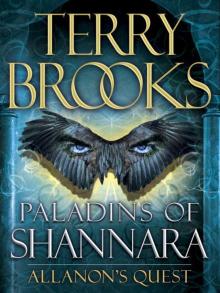 Allanon's Quest
Allanon's Quest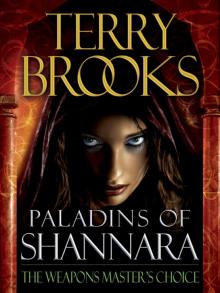 Paladins of Shannara: The Weapons Master's Choice
Paladins of Shannara: The Weapons Master's Choice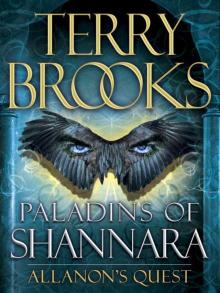 Terry Brooks - Paladins of Shannara - Allanon's Quest (Short Story)
Terry Brooks - Paladins of Shannara - Allanon's Quest (Short Story) Star Wars Episode I: The Phantom Menace (star wars)
Star Wars Episode I: The Phantom Menace (star wars)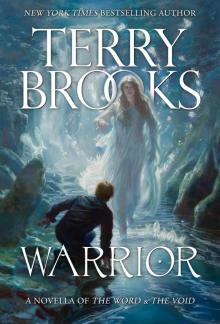 Warrior (The Word and the Void)
Warrior (The Word and the Void)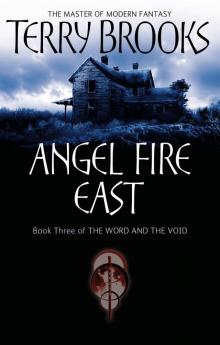 Word & Void 03 - Angel Fire East
Word & Void 03 - Angel Fire East![[Magic Kingdom of Landover 05] - Witches' Brew Read online](http://i1.bookreadfree.com/i2/04/05/magic_kingdom_of_landover_05_-_witches_brew_preview.jpg) [Magic Kingdom of Landover 05] - Witches' Brew
[Magic Kingdom of Landover 05] - Witches' Brew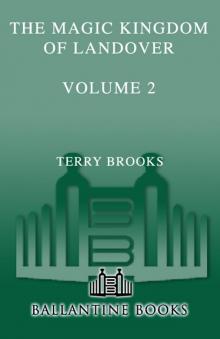 The Magic Kingdom of Landover - Volume 2
The Magic Kingdom of Landover - Volume 2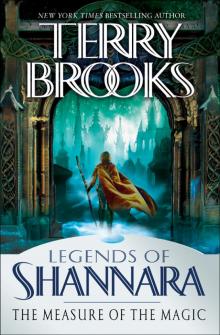 The Measure of the Magic
The Measure of the Magic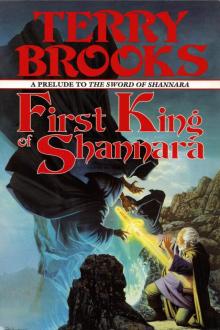 The First King of Shannara
The First King of Shannara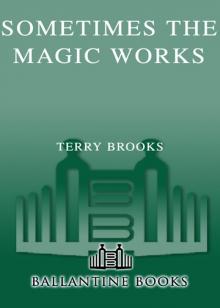 Sometimes the Magic Works
Sometimes the Magic Works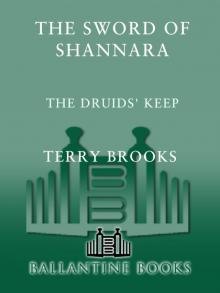 The Sword of Shannara, Part 2: The Druids' Keep
The Sword of Shannara, Part 2: The Druids' Keep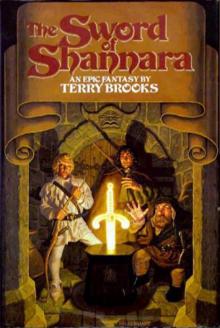 The Sword of Shannara tost-1
The Sword of Shannara tost-1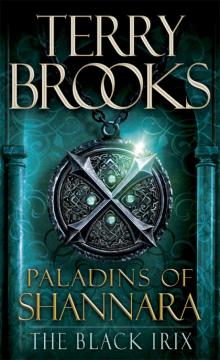 Paladins of Shannara: The Black Irix (Short Story)
Paladins of Shannara: The Black Irix (Short Story)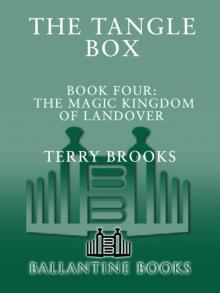 Tangle Box
Tangle Box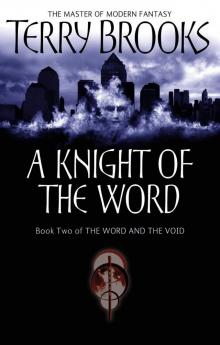 Word & Void 02 - A Knight of the Word
Word & Void 02 - A Knight of the Word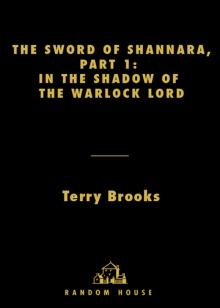 The Sword of Shannara, Part 1: In the Shadow of the Warlock Lord
The Sword of Shannara, Part 1: In the Shadow of the Warlock Lord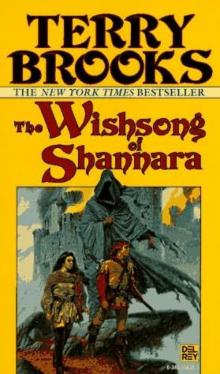 The Wishsong of Shannara tost-3
The Wishsong of Shannara tost-3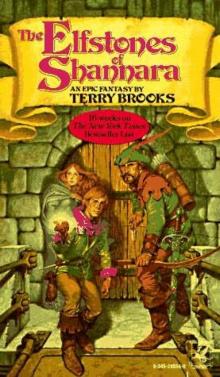 The Elfstones of Shannara tost-2
The Elfstones of Shannara tost-2